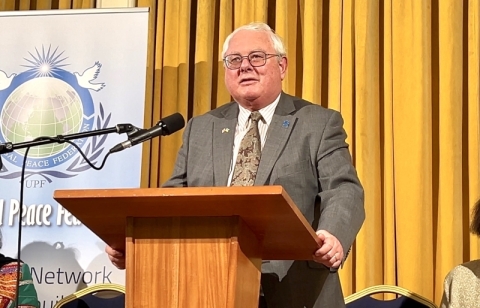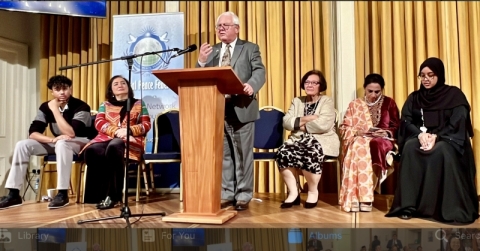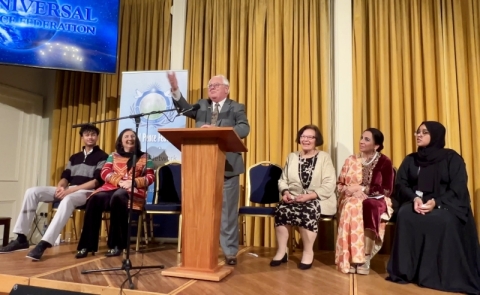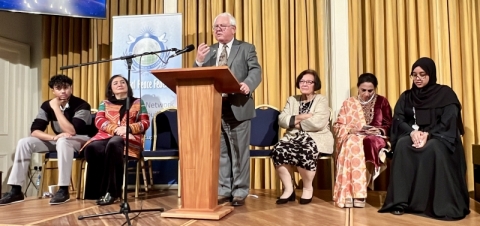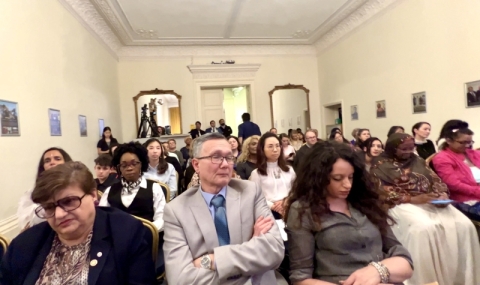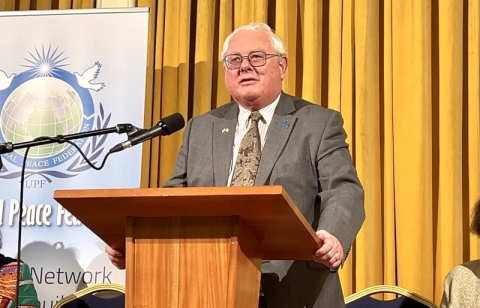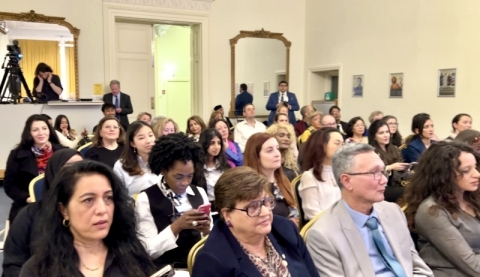News
Universal Peace Federation (UPF): 19 March 2024 speech by Keith Best
International Women's Day London UK

A (Source: Ak)
USPA NEWS -
Women in politics have been woefully under-represented in the UK and elsewhere throughout history but those who have made it have had a disproportionate influence not least because of their capacity to break the mould. This situation is hardly surprising taking account of how women have been, and continue to be, suppressed in many countries and denied civil and political rights that men have enjoyed for centuries.
In countries that like to describe themselves as civilised such change as there has been has only been almost within living memory. Couverture was a legal doctrine in the English common law in which a married woman's legal existence was considered to be merged with that of her husband, so that she had no independent legal existence of her own. Upon marriage, coverture provided that a woman’s legal rights and obligations were mostly subsumed by those of her husband. Only an unmarried woman had the right to own property and make contracts in her own name.
In countries that like to describe themselves as civilised such change as there has been has only been almost within living memory. Couverture was a legal doctrine in the English common law in which a married woman's legal existence was considered to be merged with that of her husband, so that she had no independent legal existence of her own. Upon marriage, coverture provided that a woman’s legal rights and obligations were mostly subsumed by those of her husband. Only an unmarried woman had the right to own property and make contracts in her own name.
Before 1870, any money made by a woman (either through wages, from investment, by gift or through inheritance) instantly became the property of her husband once she was married, with the exception of a dowry. The dowry provided by a bride's father was to be used for his daughter's financial support throughout her married life and into her widowhood and was also a means by which the bride's father was able to obtain from the bridegroom's father a financial commitment to the intended marriage and to the resultant children.
The Married Women's Property Act 1870 provided that wages and property which a wife earned through her own work or inherited would be regarded as her separate property and by the Married Women's Property Act 1882, this principle was extended to all property, regardless of its source or the time of its acquisition.
The Married Women's Property Act 1870 provided that wages and property which a wife earned through her own work or inherited would be regarded as her separate property and by the Married Women's Property Act 1882, this principle was extended to all property, regardless of its source or the time of its acquisition.
I draw your attention to a new report Pursuing Parity from the Electoral Reform Society – which I had the privilege to chair for five years and served on its Council for fifteen - by Thea Ridley-Castle, Research and Policy Officer, which examines gender quotas across different electoral systems. There is a webinar at 10.00 this Thursday for those who are interested (https://www.eventbrite.co.uk/e/making-womens-votes-count-tickets-810051163837?aff=oddtdtcreator). The summary states that throughout history, the political landscape of the United Kingdom has been predominantly shaped and governed by men. The struggle towards gender parity across the United Kingdom has been fought tirelessly throughout the 20th century. Women were given the right to stand as MPs in 1918, some women (those over the age of 30) got the right to vote in 1918, the suffrage movement won the vote on the same terms as men in 1928 and the first woman Prime Minister was appointed in 1979.
Due to coordinated efforts of campaigners and activists, over the last 100 years an increasing number of women have assumed roles in politics. This shift is particularly evident in the increase in women UK Members
Due to coordinated efforts of campaigners and activists, over the last 100 years an increasing number of women have assumed roles in politics. This shift is particularly evident in the increase in women UK Members
UK Members of Parliament who, as of February 2024, totalled 226 out of the 650 MPs (35%). Nevertheless, whilst the number of women MPs has increased, there is still a long way to go in order to achieve gender parity in elected bodies in the UK.
Across the world, as of 2 February 2024, there are only 6 Parliaments (Mexico, Nicaragua, Cuba, Rwanda, Andorra and the United Arab Emirates) which have gender parity in their lower or single house. Other countries have achieved gender parity previously, such as Wales in 2003, however these have fallen back into male majorities in recent years.
Globally there is an increasing number of women parliamentarians; in 1995 women made up only 11.3%, whereas by the end of 2022 women made up 26.5% of parliamentarians. Yet, while it is positive that there is an increasing number of women members, 2022 showed the slowest progression of women’s representation in parliaments in 6 years, only increasing 0.4% from the previous year. If this rate continues, it will take over 80 years for gender parity to be realised globally. It is evident that there is more work to be done before parliamentary gender parity becomes a reality.
Across the world, as of 2 February 2024, there are only 6 Parliaments (Mexico, Nicaragua, Cuba, Rwanda, Andorra and the United Arab Emirates) which have gender parity in their lower or single house. Other countries have achieved gender parity previously, such as Wales in 2003, however these have fallen back into male majorities in recent years.
Globally there is an increasing number of women parliamentarians; in 1995 women made up only 11.3%, whereas by the end of 2022 women made up 26.5% of parliamentarians. Yet, while it is positive that there is an increasing number of women members, 2022 showed the slowest progression of women’s representation in parliaments in 6 years, only increasing 0.4% from the previous year. If this rate continues, it will take over 80 years for gender parity to be realised globally. It is evident that there is more work to be done before parliamentary gender parity becomes a reality.
Quotas are a key mechanism to enable gender parity. In 2022 there were 18 countries which had a parliamentary change in which legislated gender quotas were in place in the single or lower house. In these countries 30.3% of the total number of MPs are women. In comparison, in countries with no gender quotas (19) which had a parliamentary renewal only 22.2% of parliamentarians elected were women. There is an 8-point percentage difference in gender parity achievement between countries with quotas and those without.
There are multiple types of gender quotas, and the ease and effectiveness of implementation can differ across voting systems. This new report, Pursuing Parity: Examining Gender Quotas Across Electoral Systems, explores the different quota mechanisms through which gender parity can be achieved, examining the benefits and the potential drawbacks of the approaches. It then assesses the ease and success of quota implementation across majoritarian and proportional voting systems. Following this, it has created country case studies of several of the approaches that explore the mechanisms in action.
There are multiple types of gender quotas, and the ease and effectiveness of implementation can differ across voting systems. This new report, Pursuing Parity: Examining Gender Quotas Across Electoral Systems, explores the different quota mechanisms through which gender parity can be achieved, examining the benefits and the potential drawbacks of the approaches. It then assesses the ease and success of quota implementation across majoritarian and proportional voting systems. Following this, it has created country case studies of several of the approaches that explore the mechanisms in action.
Pursuing Parity illustrates how implementing gender quotas and moving to a proportional representation voting system (PR) can help speed up the progress of achieving gender parity in elected bodies around the world and at home. I commend it and the webinar to those who are interested. You will gather that a system of proportional representation is the one that is most likely to promote women and so I hope that you all will become converts if you are not already. If you are not convinced then ponder the fact that the only other country in Europe apart from the UK which elects its Parliament on a majoritarian (first-past-the-post) system is the democratic haven of Belarus!
Power rests in the hands of politicians so the rise to power for women is through education (so disgracefully denied in Afghanistan) and entry into politics. You who have heard me on this subject in the past will have noted that I regard women generally as more able than men to be successful politicians and that is not just because I entered Parliament on the day Britain saw its first female Prime Minister. I stress that these are generalisations but women are more used than men to having to juggle many tasks at the same time – home management, domestic budget, elevator of children and often these days combined with a full or part-time job. Such multi-tasking is the life of a politician. Women are less polemic, though not necessarily less Machiavellian. They are more ready to seek compromise and to understand a pragmatic approach. I have no doubt that if more women were in charge of their countries’ fortunes there would be less war in the world and fewer soldiers being killed and maimed. My conclusion, therefore, is that it is not just in women’s but in men’s best interests to promote women in public life – if only men have the good sense to see it!
more information: https://Aurangzeb
Liability for this article lies with the author, who also holds the copyright. Editorial content from USPA may be quoted on other websites as long as the quote comprises no more than 5% of the entire text, is marked as such and the source is named (via hyperlink).

